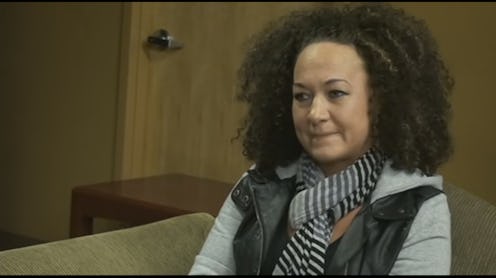
Here's the least-surprising piece of news you'll read this week. Former NAACP chapter president Rachel Dolezal's memoir, In Full Color: Finding My Place in a Black and White World, is actually super problematic. The book will explore the alleged "discrimination [Dolezal has] suffered while living as a black woman" in the U.S.
There are a lot of glaring issues with this, so let's start with the biggest one: Dolezal is not black. The 39-year-old was forced to resign from her position with the NAACP in 2015, after her white Evangelical parents came forward to reveal that she had been hiding and lying about her heritage. To be clear, Dolezal was not ousted because she is white, but because she spent years lying and living in blackface.
Since the truth about her background broke, Dolezal has continued to claim that she is black, regardless of her heritage, because everyone is a little bit African, because she identifies strongly with black culture, and because she has "really gone there with [her] experience."
Ugh.
Dolezal has also compared herself to Caitlyn Jenner, a trans Olympian, a claim that gave way to debates over the legitimacy of so-called "transracial" identities. Although it's often used by white people to describe an identification with a race other than the one they were assigned at birth — A.K.A. a cultural-appropriation game so strong that it morphs into a phenomenon that does not exist — "transracial" has a very real meaning to the thousands, if not millions, of people who have been adopted by parents of a different race.
No one needs Rachel Dolezal's memoir to tell them about the discrimination black women face in the U.S., because there are plenty of memoirs written by women who are actually black. Here are just a few:
- Extraordinary, Ordinary People by Condoleezza Rice
- The Light of the World by Michelle Alexander
- Montgomery Bus Boycott and the Women Who Started It by Jo Ann Robinson
- Negroland by Margo Jefferson
- Ordinary Light by Tracy K. Smith
- Remnants by Rosemary Freeney Harding and Rachel Harding
Having Rachel Dolezal write about being black is like having Donald Trump write about being poor. In Full Color is just as problematic as that horrendous gap-year memoir about being white in Africa. It's terrible, nonsensical, and — like the rest of Dolezal's career — it steals the spotlight from black women.
Image: Lauren Campbell/YouTube